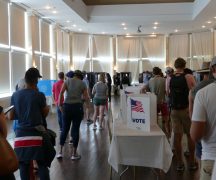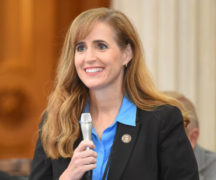By Susan Tebben
The criminal complaint against Ohio House Speaker Larry Householder and four political operatives lays out alleged bribes made to signature collectors for a voter referendum on a nuclear bailout, along with a comprehensive campaign to hire signature collection companies, just so those companies couldn’t work against the bailout effort, House Bill 6.
Householder is charged in an alleged bribery, money laundering and racketeering scheme along with Jeffrey Longstreth, Neil Clark, Matthew Borges, Juan Cespedes, and the purported social service non-profit, Generation Now, which federal investigators say was merely a Householder-controlled corporation.
Stopping signature collection
As part of the 80-page criminal complaint, the four operatives are all named in an alleged plot to keep collectors from getting those signatures, and bribing individuals to provide “inside information” about where the campaign stood.
The criminal complaint alleges that Borges was brought in to bribe an employee of the ballot campaign to repeal HB 6 for inside information. That employee then contacted the FBI after meeting with Borges in September, according to the criminal complaint.

included in the federal criminal complaint.
“Thereafter, (the employee) recorded his conversations with Borges, including Borges’ payment of $15,000 to him,” the complaint stated.
Two days after the Ohio Attorney General had approved ballot language for HB 6, Borges allegedly reached out to the employee.
The employee texted Borges after a meeting to say he would not accept the alleged bribe.
“At the beginning of this I thought I could walk my information into Larry’s office and sell it for enough to retire on,” the employee texted Borges, according to court documents.
Borges responded to the employee, saying “No matter what – don’t ever tell anyone about our conversation from earlier.”
The employee would later reconnect with Borges “at the direction of the FBI,” and Borges would offer a “substantial ‘buy out’ for sensitive information…about the Ballot Campaign.”
The investigation also alleges that Borges “stated that he and his firm were working for Company A on the ballot project and that Householder, Company A, and Borges’ firm formed an ‘unholy alliance.’”
Other bribes are alleged to have occurred between the men charged in the case and signature collectors. The criminal complaint specifies alleged bribes of $2,500 and plane fare “to stop collecting signatures and provide inside information relating to the Ballot Campaign’s HB 6 referendum efforts.”
Householder appearance
The investigation said Householder was present at a recorded dinner party with Clark, in which they discussed a discrepancy between the numbers of signatures they showed and the numbers signature gatherers had reported.
Householder was recorded again, according to investigators, discussing the ballot campaign signatures during a dinner with Clark. Clark was recorded as saying “we have to go out on the corners and buy out their people every day.” He also mentioned a strategy to “knock off” signature collectors.
“It was at this point in the conversation, when Householder interrupted…and said, ‘It is so important, it is so important, that they are not successful, because when the legislature votes on something it needs to stay law,’” according to transcripts of the recording stated in the criminal complaint.
Following that discussion, signature collectors began receiving unsolicited text messages from a contractor with a signature service with whom Clark had contacts. The company had also been paid more than $600,000 with money connected to Generation Now, according to investigators.

One signature collector said she received an offer of $2,500 and a plane ticket home after receiving unsolicited texts, according to the complaint.
In affidavits provided by signature collectors, a contract described the services needed for payment. Those included providing “statewide ballot issue advice and expert consultation on Ohio statewide ballot measures and the associated petition circulation and signature collection matters related to the referendum of HB 6 related issues, which occurs within a 90-day period upon enactment HB 6.”
The contract, according to investigators, was signed by Longstreth, with notices sent to Generation Now.
Stopping signature collection firms
Bank records show Generation Now also spent nearly $550,000 to keep national signature collection firms from working on the ballot initiative.
The criminal complaint specifically names Clark, accusing him of advising clients “that if they would retain as many of the signature collection firms as possible, then those firms could not work for their opposition,” effectively reducing the ability for the referendum group to collect signatures.
In a recorded meeting in July 2019, Clark said he had wired $450,000 “hiring signature collections people to not work.” He later confirmed that the money had come from Householder’s Generation Now.
Clark said he’d hired 15 national companies in amounts from $50,000 to $100,000 specifically to keep them from collecting signatures. Smaller companies received $10,000 sums.
A spreadsheet recovered from Cespedes lists the firms hired, and investigators state in the criminal complaint that the document was created two days after Clark was recorded.
In that phone call, Clark said “they are all full of shit. I have been a lobbyist for 39 years, been around a long time. It always goes circular to someone going well, we’ll give you a kickback.”
Records attributed to Clark show a July 23, 2019, wire from Generation Now to a signature firm for $75,000, and connect a wire of $50,000 to Clark’s contacts with another firm in July.
Subpoenaed bank records confirmed the money’s origins in Generation Now bank accounts.
“The records further show that some of these firms, along with other petition firms, received additional payments in the fall of 2019,” the complaint stated.
Investigators also connected transfers of Generation Now money to signature firms with text messages between those accused in the case, specifically Clark, Cespedes and Longstreth. Cespedes even offered to “up the budget” to hire more firms.
Once the signature campaign failed, Householder sent out a press release specifically mentioning “Company A’s failed nuclear power plants.”
“I am pleased that House Bill 6 will go into effect at midnight tonight and am confident it will produce positive results for Ohio,” Householder was quoted as saying in the press release.
***
Also from Ohio Capital Journal:
Gavarone among officials calling on Speaker Householder to resign
Ohio lawmakers from both sides of the aisle are calling on Speaker Larry Householder to resign in the wake of his arrest Tuesday on federal racketeering charges.
They join four statewide officials and the chairs of both state political parties in calling for Householder to step down. They include State Sen. Theresa Gavarone (R-Bowling Green).
While exiting a court building on Tuesday, Householder told ABC6 reporter Lu Ann Stoia he would not be resigning from office. READ MORE
Three GOP candidates pledge to return donations from Householder
A trio of Republican candidates for state representative say they will return or give away money donated to them by Speaker Larry Householder’s campaign committee.
The three are Tom Young, Brian Stewart and Marilyn John.
Young is the Republican nominee for the 42nd District in Montgomery County. He received a max donation of $13,292 in January from the “Friends of Larry Householder” committee.
Contacted by the Ohio Capital Journal, Young responded in an email that he was “shocked and very disappointed at the allegations made against Speaker Householder and his team.”
Young said he planned to return the donation. READ MORE





